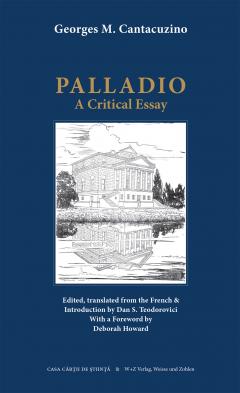As one of the most thoughtful modernist architects of his generation, Georges Matei Cantacuzino (1899–1960) certainly deserves to be better known. He was the consummate European, a Romanian aristocrat who lived much of his early life in Vienna and Paris, and fraternised with the intellectual elite of his time. Sadly, however, his growing reputation was later dampened by the events of the Second World War and the consequent division of Europe, which separated Romanian culture from its cosmopolitan pre-war horizons. […]
The present volume celebrates a key moment in the evolution of Cantacuzino’s personal architectural creed. Recognising the significance of his youthful study, Palladio: A Critical Essay (1928), Teodorovici has now translated the original French text into English, accompanied by scholarly editorial notes and some original hand-drawn illustrations. The eye-opening introduction analyses the essay in the context of those philosophers and thinkers who influenced Cantacuzino, as well as others whose views diverged markedly from his own.
